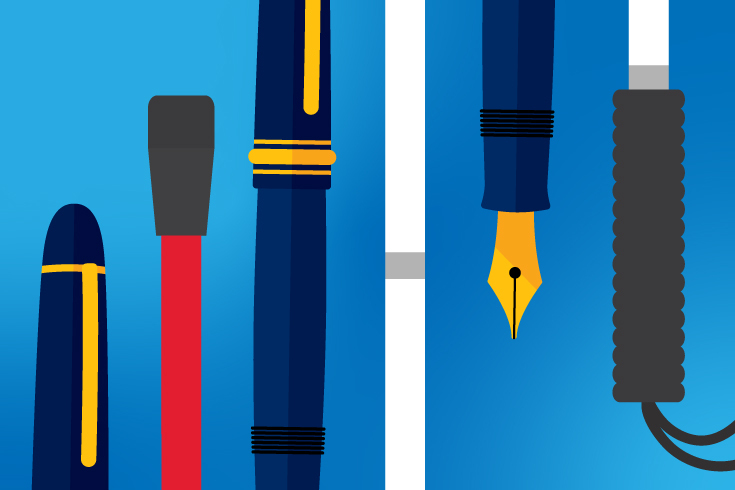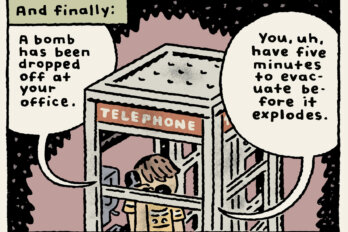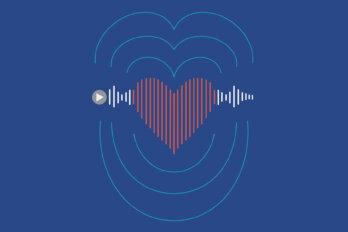My mother first thrust a copy of Mine for Keeps into my hands while we perused the children’s section of the Brantford Public Library in the summer of 1997. The girl pictured on the cover had crutches, like me. I wanted to be her friend.
Listen to an audio version of this story
For more audio from The Walrus, subscribe to AMI-audio podcasts on iTunes.
I was only eight, and I didn’t know that the book I held was more than thirty years old. I didn’t know that its author, Jean Little, was sixty-five at the time and had already amassed an award-winning catalogue cementing her as a giant of Canadian children’s literature and leading to her induction into the Order of Canada. All I knew was that I was tired of physiotherapy appointments, the result of a muscle-lengthening surgery in my left leg a few months earlier, and my mother was on the brink of losing patience with my miserable attitude.
It had been a little over a year since my family moved across southern Ontario, from London to Brantford, after my father accepted a new teaching job, and I worried my physiotherapy appointments would rob me of the chance to play with my new friends. I was also beginning to doubt I could even make real friends. While the appointments, and the cast and crutches that preceded them, made me noticeably disabled, they were—as my parents reminded me—temporary. In contrast, my impaired vision, a lifelong disability, was often overlooked or misunderstood by those around me. It was obvious to every school photographer: I have nystagmus, a condition that means my eyes don’t stay still, making it impossible to “look at the camera.” But, apart from the bifocals I needed to see clearly and my seat at the front of the classroom, there was little conspicuous evidence of just how much difficulty I had seeing.
Shortly before school ended that year, my mother chaperoned a class trip to Marineland, the aquatic theme park near Niagara Falls. My cast made navigating the amphitheatre where crowds watched the killer whale shows impossible, but when we inquired about seats for people with disabilities, we were taken to an area too far back from the stage for me to see: the standard accommodations for disability completely overlooked my needs. As we walked to our seats, I hoped I would meet another child who had difficulty seeing. I didn’t. I feigned interest in the whales’ acrobatics. Instead of the roar of the crowd, I heard a loud inner voice that nagged at me, telling me I would never belong with other disabled people. I was truly one-of-a-kind, and being “special” sucked. I feared I would never fit in, not with my disabled or nondisabled peers, even after my cast was discarded.
But, in the four opening words of Mine for Keeps, Little dismantled any notions I had that my individuality made me unknowable: “Sal Copeland was scared,” she wrote. At a glance, I most resembled Sal, the novel’s heroine, who used crutches and went to physiotherapy because of her cerebral palsy. However, closer inspection revealed I was more like the author. Like me, Little grew up in southern Ontario with an affinity for words. Both our families were involved in Protestant churches, and faith was central to our lives. Her eyesight wasn’t great either. While premature birth had left me with retinopathy that classified me as legally blind, Little had been born with scarred corneas and, as a child, was bullied because she was cross-eyed. Glaucoma claimed her remaining sight in adulthood. Both of us had parents who stressed independence and chose to enrol us in schools with sighted peers. My parents wanted me to learn how to live with those who didn’t share my disability and that, while my life would always include disability, disability was not all my life would include.
I hoped to become a published author, but I doubted I had the perseverance for it. And I was confused about whether I had to write about my disability. I had heard many people say authors should write about what they know. But my disability was so rarely discussed openly in my home, so hardly fussed over, that making it the sole subject of a story seemed like grossly exaggerating a typical and sometimes boring part of my life. What I couldn’t imagine then, as an eight-year-old sulking about summer physio, was that Little’s words would follow me across the country nearly sixteen years later, into the privacy of my bedroom, and demand I keep writing.
Throughout elementary school and into high school, Little’s books were my constant companions. Her memoirs, Little by Little (1987) and Stars Come Out Within (1990), portrayed how her parents had—like mine—taken a fairly no-nonsense approach to their daughter’s disability. Both of our mothers would listen to our tales of woe about difficulties making friends and then promptly send us back out. Participation at home and church was expected.
The memoirs showed me another little girl who considered eye-doctor appointments a regular part of life and sent her parents into a panic after getting lost on public transit. I spent my childhood with my nose pressed against the row of “L” books in the children’s section of the local library or bookstore, determined to read everything she wrote. By the time my parents gave me What Will the Robin Do Then? (1998), Little’s collection of winter-themed short stories and poems, I was regularly scribbling my own verses and prose in dollar-store notebooks. When I was eleven, one of these poems, a rare confessional about my visual impairment titled “My Eyes,” earned second place for poetry in my age category in the Kitchener Public Library’s Dorothy Shoemaker Literary Awards. Success felt as sweet as the caramel I had compared my irises to in the poem.
Little’s memoirs also showed me the way ahead, although I didn’t realize it initially. At fifteen, I loudly protested when my parents insisted I learn how to use a white cane after I repeatedly got lost coming off the bus. Later, when rereading Little by Little, I noticed the writer had used a white cane during her first year of university. I realized I was not the only person who had to surrender some independence in order to mature. If she could pull her cane out sometimes, I figured I could survive mine. In Stars Come Out Within, which chronicles part of her career, I found a mentor who described what it was like to work with editors and turn scribbled stories into published books. Her descriptions of surgeries, fittings for prosthetic eyes, and training to receive a guide dog also showed me what might happen to my vision in the future.
In 2011, shortly after graduating university with honours in English and journalism, I sent her a letter. “I don’t think I could have done it without you,” I wrote. Her answer was delayed for months, and when it arrived, her confession that some things had been misplaced made me chuckle: it proved I wasn’t the only person who could disprove the popular belief that blindness inherently leads to better organizational skills. Her response also inspired the same reaction I’d had to the cover of Mine for Keeps years ago: I wanted to be her friend.
I was overwhelmed that the author I had admired for so long wanted to hear about my life and wanted to know what subjects I felt most comfortable writing about. I didn’t have the answer to the second question, so I filed the letter away and promised myself I would write to her when I felt I could. The letter stayed at my parents’ house as I travelled and worked in Whitehorse, Saint John, and Toronto, choosing journalism as my professional writing vehicle. I covered Whitehorse city council meetings and scandals at animal shelters, I contributed to a national magazine for teachers, and I copy-edited newspapers in New Brunswick, but I was most affected by stories where hope fought for a place alongside struggle, whether for a man made newly homeless by a fire, survivors of abuse at residential schools, or a student living with a disability and seeking educational opportunities. Often, I worried about not having a specialization, and Little’s words rang in my mind. “It takes lots of writers time to find their niche,” she had written. “I was lucky in that I chanced to begin as I was meant to continue but I know others who had far more trouble. You just have to keep trying until you find where you fit.”
In December 2019, I found Little’s letter while searching for mementoes to bring to a reunion with university friends and determined to write to her in 2020, to tell her that I had started recording podcasts in addition to writing and that I was considering graduate school. Then, during the first week of April, a friend tagged me in a Facebook post that took my breath away: Jean Little had died on April 6, at a hospice in Guelph, Ontario. She was eighty-eight.
Mourning a literary giant when libraries were closed seemed almost impossible. Libraries had been crucial to Little. In a 1981 profile, she explained how children’s librarians in Guelph had helped her understand her own worth when she was growing up: “Books were important to them and so I was important too, because I was one of the people for whom books were written.”
Disabled people have long decried the lack of books written for us: when we appear in mainstream entertainment, we are often dead, cured, or seen as superhuman by the end. We are rarely allowed to simply exist with our disabilities. As a result, some of us avoid mentioning them altogether. Little possessed an early confidence as a writer that I didn’t: she had no shame in writing about disability.
Yet she wasn’t penning tales to release personal grievances. Instead, she wanted others to know they were important because books were written about characters who were similar to them. As she describes in Stars Come Out Within, she wrote Mine for Keeps so the disabled children she taught for years in Guelph could have a story with a character who has a happy ending while being disabled. Sally Copeland journeys from isolation to friendship while using crutches. Anna Solden, the main character in 1972’s From Anna and its 1977 sequel Listen for the Singing, adapts to life in Canada while living with a visual impairment and then, in her first year of high school, helps her older brother, Rudi, adjust to his blindness from being wounded in the Second World War. Disability itself was never the obstacle to be conquered.
Little didn’t always allow her disabled characters to command centre stage, however. Take Wing (1968) and Willow and Twig (2000) both depict older sisters caring for their younger brothers who have various developmental disabilities. Even Sally Copeland, who made Little a published novelist, has a turn as a secondary character, in Spring Begins in March, the 1966 novel about Sally’s younger sister, Meg. These moments force me to consider how my disability and my responses to it affected my parents, siblings, friends, and classmates. Everyone, whether they live with a disability or not, needs to learn about inclusion, her character choices say.
Despite this, I hesitated to write about my disability. I was convinced that disclosing it would cost me a career. I’d confessed as much to Little in my 2011 letter. “To be honest, it’s incredibly terrifying having a journalism degree and a visual impairment—driving seems to be essential for most jobs,” I wrote, even though, weeks before, I’d learned that an article I’d written for the school paper, about a contentious municipal redevelopment project, had won an award from a journalism union. “Sometimes it’s very easy to think I can’t get a job.”
Her answer both validated my feelings and put them into perspective. “It is not easy, I know,” she had replied, admitting what every able-bodied adult seemed hesitant to say. “But it is challenging and sometimes fun and you would not choose to turn your face to the wall and weep instead of taking part in the battle.”
I didn’t always follow her advice.
In early 2013, I sat in the walk-in closet of the bedroom I’d rented in Whitehorse and stopped fighting the tears that had been gathering since my arrival, months earlier. I did not want to have a disability. I did not want to be a writer.
Against what seemed to me like improbable odds, I had gotten a job as a community-newspaper reporter in Whitehorse. The Yukon’s sprawling, sparsely populated capital did what the accessible seating at Marineland had done years earlier: magnified everything I couldn’t do. There was little public transit, making it a lot more difficult for me to meet sources and report breaking stories. I felt slow and clumsy at work. Being published once had felt like a medal around my neck; now, with every typo, it felt like a noose strangling me, killing the image I once had of myself as an accomplished writer.
I suck, I thought, not knowing if I was referring to my writing or my attitude. And then a terrifying new thought struck: What if Jean Little somehow finds out about this? Through sniffles, I remembered her words: sometimes the journey will be a battle and sometimes it will be fun. I took a slower breath. I got up.
In August 2013, I moved to Toronto to study publishing. But, before I left Whitehorse, I found friends who were thankfully undeterred by my chunky news writing or damaged retinas. We went to winter festivals, sat in hot springs, and roasted sausages over bonfires on frozen lakes. At work, I had first taken a few assignments about disability, hoping for a compliment from my boss. In interviews, I heard people say how much they needed someone who understood some of the systemic problems surrounding social responses to disability to write about them. I swallowed my pride and told my readers about the disabled people often misunderstood in their community. Before moving to Toronto, I went to Well-Read Books, a used bookstore, and purchased Little’s 1995 account of her mother’s life, His Banner over Me. It was my way of telling her I was surviving, looking for my niche.
Making disability part of one’s writing niche carries the risk of audiences and critics neglecting work not directly related to disability. As a journalist, I worry about not being considered objective or fair if readers learn I have a disability and, at times, write on social policies about disability inclusion or on my experiences with those systems. Little’s writing, while revered, has also been misunderstood at times. Discussions of her work often assume her primary goal was to teach about disability. My copy of Mine for Keeps comes from its eighth printing, and the summary on the dust cover boldly concludes: “Readers will find in Sally’s story much that expresses their own feelings even though they have two good legs to run on. . . . And they will begin to see that the most painful differences among people need not matter at all.” Similarly, an April 1973 review of From Anna in the Journal of Reading declares the book could “help a normally sighted child understand the difficulties of a visually handicapped youngster.”
Some early critics even expressed disdain for Little’s works. Her second novel, 1965’s Home from Far, centres a young girl grieving her twin brother’s death. Plots like this caused one notable critic to dismiss Little’s books as “bibliotherapy,” meant to teach children how to respond to hardship. Decades later, Little responded to this criticism in a 2016 lecture. “My readers have not mistaken Sally’s story for a dose of bibliotherapy,” she told the crowd at Toronto’s Harbourfront Centre. “Any good story can be therapeutic to a reader, but it must be a good story,” she continued. “Not a prescription written to solve a children’s problem.”
Sally and Anna weren’t remarkable to me as a disabled child. In lieu of other disabled children, these characters, and their author, mentored me on how to live a good life in a disabled body. But they could not live my life for me. Neither could Jean Little.
I have turned my head to the wall and wept many times: when I interpreted a former editor’s statement that I was good at writing news features about disabilities as proof that I would only ever be a disability writer (and that this was a bad thing); when the disclosure of my disability destroyed momentum in job interviews; when I realized I may forever be explaining my disability to the world around me. But, on the day Jean Little died, I was devising my own battle strategy, reporting on concerns families had about whether their loved ones with disabilities would receive proper hospital care during COVID-19. I would pick up the phone and talk to strangers, and by the time the call ended, they may have still been scared, but they were also known.





